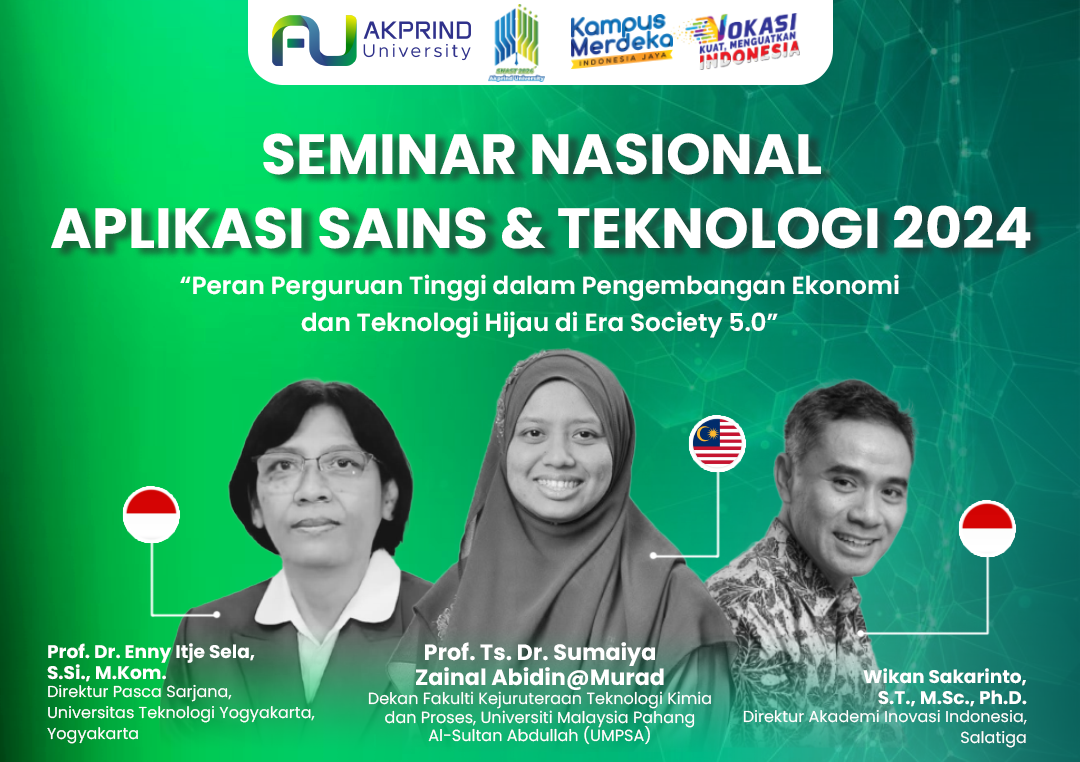MODEL KINERJA TENAGA KEPENDIDIKAN BERBASIS INTEGRASI SPIRITUAL LEADERSHIP THEORY, MOTIVATION THEORY DAN ISLAMIC SPIRITUAL THEORY
DOI:
https://doi.org/10.34151/prosidingsnast.v1i1.5078Keywords:
Spritual Leadership, motivasi, kepuasan, kinerjaAbstract
Tujuan studi ini adalah menguji dan menganalisis faktor spiritual leadership dan motivasi terhadap kinerja tenaga kependidikan dengan kepuasan kerja sebagai variabel intervening. Sampel studi ini tenaga kependidikan di Surakarta, dengan metode Path Analysis. Hasil penelitian menunjukkan bahwa Spritual leadership, motivasi dan kepuasan kerja berpengaruh positif terhadap kinerja tenaga kependidikan. Spiritual leadership dan motivasi berpengaruh positif terhadap kepuasan kerja. Kepuasan kerja memediasi pengaruh spiritual leadership dan motivasi terhadap kinerja tenaga kependidikan. Mengingat hal itu maka pimpinan mesti memperhatikan kepuasan kerja tenaga kependidikan. Disamping itu, karena mayoritas penduduk Surakarta beragama Islam, maka studi memperkenalkan spiritual leadership dalam perspektif dinamakan Islamic Spiritual Leadership (ISL). ISL ini diharapkan bermanfaat meningkatkan kepuasan kerja, muaranya kinerja tenaga kependidikan.
Kata kunci: Spritual Leadership, motivasi, kepuasan, kinerja
References
Amelia, R.F.,Febriani, R., & Sa’diyah, C. (2022). The Effect of Islamic Leadership on Employee Performance mediated bu Job Satisfaction. Jurnal Manajemen Bisnis dan Kewirausahaan, 2(4). DOI: 10.22219/jamanika.v2i04.23805.
Anisya, V., Supriyanto, A.S., & Ekowati, V.M. (2021). The Effect of Motivation on Employee Performance through Organizational Culture. Journal of Economics, Finanace, and Management Studies, 4(7), 1028-1033. ISSN (print): 2644-0490, ISSN (online): 2644-0504, Article DOI: 10.47191/jefms/v4-17-16.
Arisman, A. (2022). The Effect of Leadership Style and Motivation on Employee Performance. Journal Multidisiplin Madani. DOI: 10.55927/mudima.v2i5.388.
Augustinius, D.C. & Halim, C.F. (2021). The Effcet of Motivation towards Employee Performance for Café Workers in Medan. Journal of Accounting & Management Innovation, 5(1), 44-56
Azmy, A., Priyono, A., Widyaningsih, A., Sulistyo, A., Anggraheni, R., & Riyadi, S. (2021). The Influence of Spiritual Leadership and the Complexity of Assignmentson Job Satisfaction and Employee Performance at Paramadina University. International Journal of Management, Accounting, and Economics, 8(10). ISSN 2383-2126.
Chen,G. & Huang, C. (2023). The Influence of Spiritual Leadership on Job Satisfaction: The Mediating Effect of Employee’s Optimism and the Moderating Effect of Machiavellian Personality. ICMETSS, 634-647. https://doi.org/10.2991/978-2-494069-45-9_77.
Gael, R. & Ramamdhania, R. (2022).The Influence of Spiritual Leadership and Religiosity on Employee Performance with Job Satisfaction as an Intervening Variable (Empirical Study ob Bank Kalbar Syariah). Optimism: Journal of Management Business Entrepreneurship and Organization, 1(1).
Geopani, T., Suherman, A.R., Jannah, A., & Suswanto, D. (2024). The Influence of Motivation and Work Competence on Employee Performance. Majalah Bisnis & IPTEK, 17(1). DOI: https://doi.org/10.55208/bistek.v17i1.556.
Handayani, H.N.F. (2022). Effect of Workload and Work Environment on Work Motivation and Its Imolications on Employee Performance at PT Ciptajaya Sejahtera Abadi. Dinasti International Journal of Education Management and Social Science, 3(4). DOI: https://doi.org/10.31933/dijemss.v3i4.1177.
Haedar, H., Apriyanti, A., & Kasran, M. (2021). The Effect of Motivation on Employee Performance with Organizational Culture as a Moderating Variable. Kontingensi: Jurnal Ilmiah Manajemen, 9(2), 653-659. https://doi.org/10.56457/jimk.v9i2.226.
Hartawati, S.I. (2019). The Effect of Motivation on Employee Performance at the Regional Revenue Agency Office Majene Regency. Balance Jurnal Ekonomi, 15(1). DOI: https://doi.org/10.26618/jeb.v15i1.2151.
Idawati, K. & Mahadun, H. (2022). The Role of Spiritual Leadership in Improving Job Commitment, Organizational Citizenship Behavior, and Employee Performance. JAM: Jurnal Aplikasi Manajemen, 20(3).
Janitra, A.S., Emilisa, N., & Alderbaran, G.J. (2024). Pengaruh Spiritual leadership dan Employee Resilience terhadap Employee Performance Dimediasi Work Engagement di Bank BUMN Jakarta Timur. Jurnal Syntax Admiration, 5(7).
Kartika, A., & Patmarina, H. (2024). The Effcet of Motivation and Work Discipline on Employee Performance at Rengganis Restaurant, Bandar Lampung City in 2023. International Journal of Economics, Business, and Innovation Research (IJEBIR), 3(2).
Kawiana, I.G.H. (2019), Spiritual Leadership: Membangun Kinerja Organisasi, Bali: UNHI Press.
Kettapan, K., Suphattanakul, O., Sui, J.M., & Hussain, S. (2022). Structure Equation Model of Causal Factors Affecting Employees’ Performance in Modern Trade Organization. International Journal of Sustainable Development and Planning, 17(4), 1141-1146. https://doi.org/10.18280/ijsdp.170411.
Khuan, H., Kurniyanto, I.R., Sono, M.G., Hina, H.B., Utami, E.Y., & Dyatmika, S.W. (2023). Improving Employee Performance through Spiritual Leadership and Work Motivation with Job Satisfaction as Moderation. Journal of Law and Sustainable Development, 11(9). DOI: https://doi.org/10.55908/sdgs.v11i9.888
Kisaka, M.A. (2019). Involvement and Employee Performance in Public Universities in Uganda. Global Journal of Political Science and Administration, 7(3), 51-65. Print ISSN: 2054-6335(Print), Online ISSN: 2954-6343(Online)
Kusnandar, V.B. (2021). Sebanyak 78,95% Penduduk Kota Solo Beragama Islam pada Juni 2021. databox, 22 September.
Kuswati, Y. (2020). The Effect of Motivation on Employee Performance. Budapest International Research and Critics Institute (BIRCI-Journal) Humanities and Social Sciences, 3(2), 995-1002. DOI: 10.33258/birci.v3i2.928.
Mahfud, I. (2023). The Role of Spiritual leadership in Improving Employee Performance. Priviet Social Sciences Journal, 3(11). DOI: https://doi.org/10.55942/pssi.v3i11.256.
Maryati, T., Astuti, R.J., & Udin, U. (2019). The Effect of Spiritual Leadership and Organizational Culture on Employee Performance: The Mediating Role of Job Satisfaction. International Journal of Innovation, Creativity, and Change, 9(3).
Ndow, O., Fanneh, M.M., & Badjie, G. (2024). The Effect of Motivation on Employee Performance: A Case of Gambia Ports Authority in the Gambia. Proceeding Kilisuci International Conference on Economic and Business, 2. https://proceeding.unpkediri.ac.id/index.php/kilisuci/article/vew/4576.
Nugroho, A.P. (2022). Mendalami Makna dan Tujuan Spiritualitas dalam Islam. El-Hekam Jurnal Studi Keislaman, &(1). P-ISSN: 2528-2506. E-ISSN: 2549-8940. DOI: http://dx.doi.org/10.31958/jeh.v7i1.10567.
Muftiyanto (2020). Pengaruh Spiritual Centered Leadership, Motivasi terhadap Kinerja. Skripsi. STIE Widya Wiwaha.
Pratolo, S. (2024). Akuntansi Holistik (Holyaccounting): Instrumen Tatakelola dan Manajemen untuk PTS Naik Kelas. Universitas Muhammadiyah Yogyakarta,
Putra, G.B.L., Widayani, A.A.D., & Widnyana, I. (2022). The Effect of Spiritual Leadership and Organizational Culture on Employee Performance with Organizational Citizenship Behaviors (OCB) as Intervening Variable. American Journal of Humanities and Social Sciences Research (AJHSSR), 6(7), pp.264-272. e-ISSN: 2378-703X.
Putra, S.W., Pono, M., & Wahda (2023). The Effect of Work Stress and Work Motivation on Employee Performance. Ilomata International Journal of Management, 4(3), 329-339. DOI: https://doi.org/10.52728/ijjm.v4i3.811.
Putri, A.N., Anwar, Natsir, U.D., Hasbiah, S., & Hamka, R.A. (2024). The Influence of Motivation on Employee Job Satisfacion in Perumda Air Minum Kota Makassar. Jurnal Ilmu Manajemen, 12( 2). DOI: https://doi.org/10.33884/jimupb.v12i2.8848
Qudus, A., Khan, S., Husnain, M., & Tabassum, M.F. (2021). Impact of Islamic Spiritual Leadership on Teacher’s Performance and teacher’s Life Satisfaction. Indian Journal of Economics and Business, 20(4). http://www.ashwinanokha.com/IJEB.php.
Rahmatika, A.N., Ma’arif, S., & Kholifah, S. (2022). The Effect of Spiritual Leadership and Psychological Empowerment on Employee Performance. Management of Islamic Education, 7(3). DOI: https://doi.org/10.31538/ndh.v7i3.2678
Rajni (2022). A Study of Theoretical Concepts of Job Satisfaction. International Journal of Innovative Science and Research Technology. ISSN No: 2456-2165.
Sana, J.W., Putra, I.B., & Amerta, M.S. (2023). The Effect of Spiritual Leadership and Organizational Culture on Employee Performance with Organizational Commitment as a Mediator. International Journal of Advanced Research. DOI: https://dx.doi.org/10.21474/IJAR01/16156
Sodiq, A., Ratnasari, R.T., & Mawardi, I. (2024). Analysis of The Effect of Islamic Leadership and Job Satisfaction on Sharia Engagement and Employee Performance of Islamic Banks in Indonesia. Jurnal Bisnis dan Manajemen, 11(1). https://doi.org/10.1080/23311975.2024.2362772.
Sudirman, S., Asrin, A., & Rakhmat, J. (2020). Faktor Penentu Kinerja Tenaga Kependidikan di Perguruan Tinggi. Jurnal Ilmu Sosial dan Pendidikan, 4(4). DOI: 10.58258/jisip.v4i4.1585.
Sugiardi, A. (2016). The Urgence of the Role of Spiritual Leadership on Intrinsic Motivation and Organizational Commitment and Their Impact on Job Satisfaction. Jurnal of Islamic Economic Business, 2(1), 73-96.
Supriatna, D., Narimawati, U., & Sunarsi, D. (2024). The Influence of Motivation on Employee Performance through Compensation as Mediation. Scientific Journal of Reflection: Economic, Accounting, Management, & Business, 7(2). DOI: https://doi.org/10.37481/sir.v7i2.855.
Supriatna, D., Narimawati, U., & Sunarsi, D. (2024). The Influence of Motivation on Employee Performance through Compensation as Mediation. Scientific Journal of Reflection, 7(2). DOI: https://doi.org/10.37481/sir.v7i2.855.
Triansyah, F.A., Hejin, W., & Stefania, S. (2023). Factors Affecting Employee Performance: A Systematic Review. Journal Markcount Finance, 1(3), 150-159. https://doi.org/10.55849/jmf.v1i2.102.
Wang, M., Guo, T., Ni, Y., Shang, S., & Tang, Z. (2019). The Efect of Spiritual Leadership on Employee Effectiveness: An Intrinsic Motivation Perspective. Front. Psychol., Sec. Organizational Psychology, 9. doi: https://doi.org/10.3389/fpsyg.2018.02627.
Wikaningtyas, S.U., Tjahjono, H.K., Suprihanto, J., & Muafi (2023). Turnover Intention Model: Self-Determination Theory Approach. Calitatea: Access la Success; Bucharest, 24(194), 166-176. DOI: 10.47750/qas/24.194.20.
Downloads
Published
Issue
Section
License
Copyright (c) 2024 Suci Utami Wikaningtyas, Lilik Ambarwati, Ary Sutrischastini

This work is licensed under a Creative Commons Attribution-NonCommercial-ShareAlike 4.0 International License.







